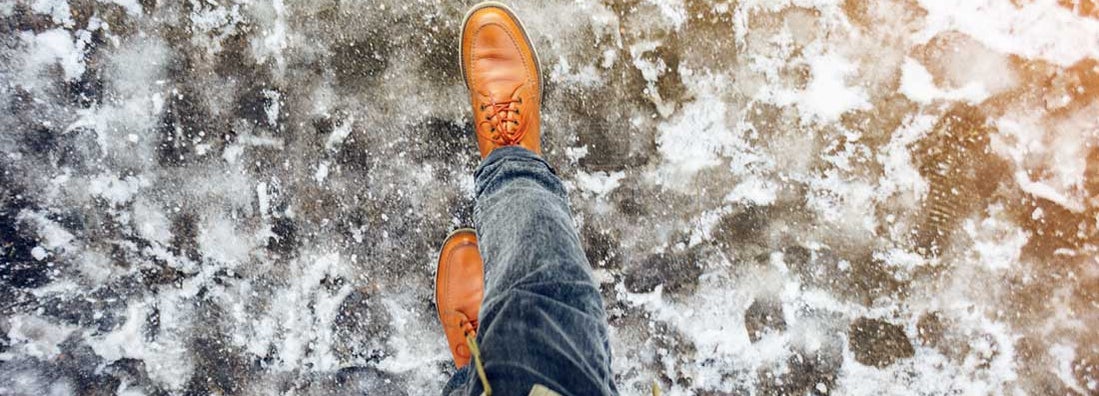Who’s Responsible for an Icy Sidewalk Slip and Fall?

Paul Martin is the Director of Education and Development for Myron Steves, one of the largest, most respected insurance wholesalers in the southern U.S.

A homeowner's responsibility is to keep their property clean and safe for all visitors and even folks just walking by. But things can get a little hazy when considering the area of your sidewalk. Are you responsible for injuries that happen on your sidewalk when it's icy, or is the city?
Fortunately, an independent insurance agent can help you answer this question. They'll also be able to help you get set up with any type of coverage that could protect you in this scenario. But for starters, here's a breakdown of who's really responsible for icy sidewalk injuries.
If Someone Gets Injured on My Icy Sidewalk, Am I Responsible?
The answer to this really depends on your local ordinances, because some areas dictate that it's the homeowner's responsibility to keep their sidewalks clear, while others rule that it's the city's responsibility. Knowing which category you belong to is critical, particularly if you live somewhere that's prone to harsh weather like snow and ice.
That said, usually a homeowner wouldn't be held responsible for any injuries that occurred on their icy sidewalk if the snow/ice storm was still going on. When the storm's already over, you'd need to refer to your local ordinances about whether you're responsible for clearing your sidewalk, and how soon after the storm ends it must be done.
How Do I Determine My Homeowner Responsibilities Properly?
Start by checking in with your local regulations about whether your sidewalk is considered private property (yours) or public property. Public property is often the government's responsibility to maintain and keep clear of precipitation. But if the sidewalk is considered your property or your city mandates that all homeowners must clear their own portion of the sidewalk, then it is your job to clear it of snow and ice after every storm.
According to insurance expert Paul Martin, a homeowner can be held responsible for injuries on their icy sidewalk if the freezing was caused by runoff from the home's gutters before temperatures dropped. You can also be held responsible if your local ordinances mandate that keeping your sidewalk clear is your job, or if you intentionally injure someone on your property. Understanding your responsibilities as a homeowner makes it especially relevant to consider checking in with your town's ordinances, as well as getting a homeowners insurance policy.
Do I Really Need to Be Concerned about Icy Sidewalks?
Slips and falls on icy sidewalks are some of the most common injuries to occur during winter. Just one incident on the sidewalk in front of your home could result in a lawsuit and the necessity of filing insurance claims. Being aware of your sidewalk's status and your responsibilities as a homeowner at all times is absolutely necessary.
What Does Home Insurance Cover?
Your coverage is designed to protect all aspects of the home, not just injuries that can occur on your sidewalk or other areas of your property. Most homeowners insurance policies come with four core protections, including:
- Dwelling damage: This aspect of home insurance can reimburse for damage caused by ice and other listed perils to your home's structure.
- Contents damage: This aspect of home insurance can reimburse for repairs or the replacement of your personal property like furniture if gets stolen, damaged, or destroyed by a listed peril like fire.
- Personal liability: This aspect of home insurance can reimburse for attorney and court costs if you get sued by a third party for bodily injury or personal property damage.
- Additional living expenses: If your house suffers damage that's beyond repair, most policies will pay for a hotel and other living expenses, including groceries.
An independent insurance agent can get you set up with a home insurance policy that's right for your needs.
How Does Home Insurance's Liability Coverage Protect Me?
Liability coverage is included in standard homeowners policies no matter where you live. It protects you in two major ways, which are:
- Medical costs: Costs related to a third party’s injuries sustained on your property can be reimbursed by your home insurance's liability coverage.
- Legal protection: Costs related to your legal defense and settlement fees you may be ordered to pay can be reimbursed by your home insurance's liability coverage.
Be sure to review your home insurance's liability coverage section with your independent insurance agent to be sure of how exactly it works for you.
Is Umbrella Insurance Necessary?
For major lawsuits, the liability coverage provided by home insurance might not cut it. Umbrella insurance policies work by extending the liability coverage provided by another policy, such as homeowners insurance, to a limit of $1 million or more. Umbrella insurance is an affordable option to seriously increase your liability coverage.
You might even need umbrella insurance just to fully cover an icy sidewalk injury during the winter. There have been documented settlements of as much as $525,000 for a single ice slip-and-fall accident. Your independent insurance agent can further advise on whether adding umbrella insurance would be a good choice for you.
Why Choose an Independent Insurance Agent?
Independent insurance agents simplify the process by shopping and comparing insurance quotes for you. Not only that, but they’ll cut through the jargon and clarify the fine print so you'll know exactly what you’re getting.
Independent insurance agents also have access to multiple insurance companies, ultimately finding you the best home insurance coverage, accessibility, and competitive pricing while working for you.
https://www.lependorf.com/slip-and-fall/icy-sidewalk.html
https://www.iii.org/article/what-homeowners-insurance
https://www.delmartimes.net/sddmt-the-top-5-causes-of-home-related-accidents-2013may30-story.html
